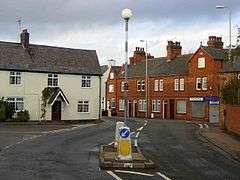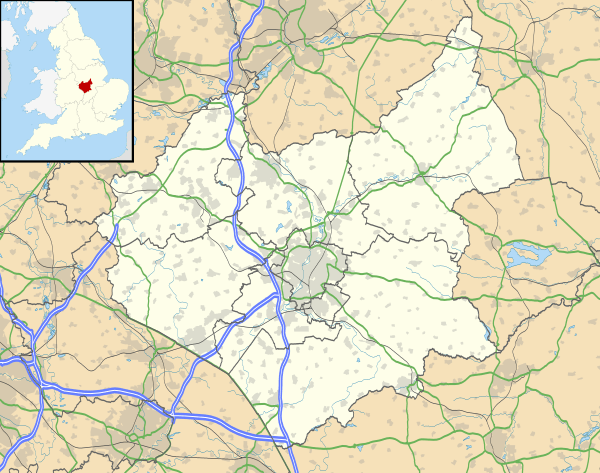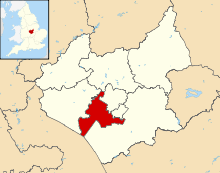Sapcote
Sapcote is a small village in the south west of Leicestershire, England, with a population of approximately 2,700, measured at the 2011 census as 2,442.[1] The well-known inland scuba diving site Stoney Cove is nearby.
| Sapcote | |
|---|---|
 | |
 Sapcote Location within Leicestershire | |
| Population | 2,442 (2011) |
| OS grid reference | SP490932 |
| District |
|
| Shire county | |
| Region | |
| Country | England |
| Sovereign state | United Kingdom |
| Post town | Leicester |
| Postcode district | LE9 |
| Police | Leicestershire |
| Fire | Leicestershire |
| Ambulance | East Midlands |
It was mentioned in the Domesday Book as Scepecote. Its name came from the Anglo-Saxon Scēapcot = "shed or enclosure for sheep" - a bit like Shepshed.
History
An early Bronze Age occupation site has been discovered here, and a Roman villa and bath house dating from the 1st century AD. Druids, Saxons, Romans and Normans have been known to have inhabited the area in and around Sapcote.
From the 12th-14th century the village was the home of the powerful Basset family. Ralph de Basset was High Sheriff of England and, possibly, the first Member of Parliament, being the first Lord to be called to the Barons Parliament by Simon de Montfort.
Buildings
The oldest surviving building in the village is the 12th century All Saints Parish Church, an elegant well-proportioned building of Early English style. At one time all its windows had the Basset coat of arms, but these have now disappeared, except for a trace in one window. A chantry was added by Ralph de Basset in 1376 and is the present north aisle. The Wesleyans built their first church in Sapcote in 1805. In 1902 a square stone-built structure was erected. The stone was quarried by the men of the church and they made such a good job of it that the church remains as one of the best buildings in Sapcote. It opened in 1905 and is a fine example of the Arts and Crafts period.
In 1806 a bath house was built by John Frewen Turner over the so-called Golden Well in Stanton Road, in an attempt to turn Sapcote into a Spa. In the building were cold and warm baths, and treatment was given for nervous rheumatic and scrofulous complaints. The building cost around £600, and Prime Minister George Canning, Duke of Wellington and Mr Lines all visited the baths.
Other historical buildings include several thatched cottages, Park Farm, a timber-framed house in Stanton Road which is dated 1683, the Old School in Leicester Road which was built in 1819, and the Stanley Burrough's Almshouses in Cooke's Lane, erected in 1847.
People
Other historical figures to have lived in Sapcote include actor Bill Maynard who played Claude Greengrass in Heartbeat, The Etwars and John Wood. John Wood was famously referred to in the Guardian Guide as providing ' contemporary acoustic vibes' at his sell out show in Leicester in 1998.
References
- "Civil Parish population 2011". Neighbourhood Statistics. Office for Statistics. Retrieved 20 June 2016.
External links
| Wikimedia Commons has media related to Sapcote. |
